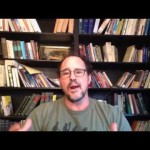We run our website the way we wished the whole internet worked: we provide high quality original content with no ads. We are funded solely by your direct support. Please consider supporting this project.

A Police Officer Questions Pacifism
Police Officer: My theology totally lines up with your theology, except in one area: namely, your pacifism. I am a police officer, and it frankly seems obvious to me that there are times when it is proper, if not godly, to use whatever level of force is necessary to stop an aggressor from harming loved ones or other innocent people. Not only this, but the apostle Paul explicitly teaches that God uses the sword (or gun) of government to exact vengeance on sinners and to keep sin in check (Rom. 13:1-7). Every other aspect of your theology makes so much sense except this one! So can you please explain to me why you don’t believe this is a viable and even noble role for a disciple of Jesus to play?
Greg: Thanks so much for your honest question. I readily grant that it seems obvious that a person should use whatever force is necessary to defend loved ones or other innocent people from aggressors. And I don’t deny that the role of a police officer is a noble one that requires great courage. Indeed, I am thankful for those who accept this role. And, finally, I don’t for a moment deny that God uses the sword of government to exact vengeance and to keep sin in check.
But to acknowledge that the role of a police officer makes sense, is noble, and is used by God is NOT to say that this is a role a disciple of Jesus should assume. When Jesus and Paul talk about loving, blessing, and serving enemies, and when they talk about never resisting force with force (Mt 5:39-45; Lk 6:27-36; Rom 12:14-21), they never make any qualifications. In fact, I would argue that these teachings rule out the possibility of there being any qualifications, for we are to love like the rain falls and the sun shines. We are to love indiscriminately. Moreover, in his 1st century Jewish context, when Jesus speaks of “enemies,” the first group his audience would think of would be the Romans who ruled over Jews by threatening terror. These were the very worst kind of “enemies” we could imagine. So if Jesus’ teaching encompasses this kind of “enemy,” I submit that it encompasses every kind of “enemy.”
Along these same lines, while the use of force makes sense within the fallen kingdoms of this fallen world, followers of Jesus are called to put on display a radically different ALTERNATIVE kingdom — the “kingdom of God.” We are to be a visible sign to the world of what it looks like when God reigns over the lives of people and a sign of what the world will look like when God establishes his kingdom throughout the world. We are to be the “first fruits” of the coming “harvest.” And since there will be no violence once God’s kingdom is established in the world, I believe we are to refrain from all violence now.
This is also why Christians are called “a royal priesthood” (I Pet 2:5, 9). While other Israelites in the Old Testament were allowed to use the sword, those who served as God’s priests could not. In this way these priests bore witness to the truth that, while God will stoop to bring as much good out of violence as he can, his ideal will is non-violence. On this note, it’s interesting that just before Paul taught that God uses sword-wielding governments to “exact vengeance” (ekdikos) (Rom13:4), he told Christian to “never exact vengeance” (ekdikeō), but to instead leave all vengeance to God (Rom 12xxx) – who, we find out, uses government for this purpose. As I see it, this means disciples of Jesus are forbidden to engage in the exacting of vengeance that God uses sword-wielding governments to carry out. This role makes sense and can even be noble, but this doesn’t make it appropriate for kingdom people.
This is how I see it. I simply find no alternative interpretation of Scripture plausible. But I want you to know that I don’t for a second judge you if you end up seeing it differently. I rather applaud your willingness to honestly wrestle with this question. We each have to “work out our salvation with fear and trembling” (Phil 2:12).
Continue to be honest with God, yourself and others as you process this issue, and God will guide you in the path you should take.
Bless you and keep you safe as you strive to keep others safe.
Greg
Image by Sky Noir via Flickr.
Category: General
Tags: Non-Violence, Pacifism
Related Reading

How Should We Respond to Bullies?
Greg answers a question from parents as to how their child should respond to a bully.

Responding to Critics of a Pacifist View of the Syrian Crisis-Part 2
United Nations Photo via Compfight Yesterday I posted a response to Tyler Tully’s criticism of some of my thoughts on the Syrian crisis. The second blog I’d like to review is Two Friars and a Fool by Aric Clark. Like Tully, Aric approved of much of what I said, but also like Tully, he raised several…

On the Language of “Revolution”
Nick Thompson via Compfight Question: The banner of your website and the thrust of much of your teaching focuses on “revolution.” While I can see a radical call in some of the sayings of Jesus, especially if he were addressing upper-middle class North Americans, I wonder if attaching revolutionary language to his teaching seems a…

Following Jesus from the Margins
D. Sharon Pruitt via Compfight Kurt Willems posted a reflection today entitled From the Margins: Following Jesus in a post-Christian culture. I hope everyone will read this. It’s a perspective from the anabaptist tradition that finds inspiration from the same data that evangelicalism finds alarming. May we all follow Jesus from the margins and offer…

Be the Change Now
Ghandi once said, “Be the change you want to see in the world.” It’s a profoundly Kingdom teaching. It seems to me, however, that few people adopt Ghandi’s philosophy. It’s far easier to focus our attention on how others should change. It’s far easier to spend our energy assigning blame for the problems of society…

Quotes to Chew On: Religious Violence
“The myth of religious violence promotes a dichotomy between us in the secular West who are rational and peacemaking, and them, the hordes of violent religious fanatics in the Muslim world. Their violence is religious, and therefore irrational and divisive. Our violence, on the other hand, is rational, peacemaking, and necessary. Regrettably, we find ourselves forced to bomb them into the higher rationality.” ~William Cavanaugh,…
